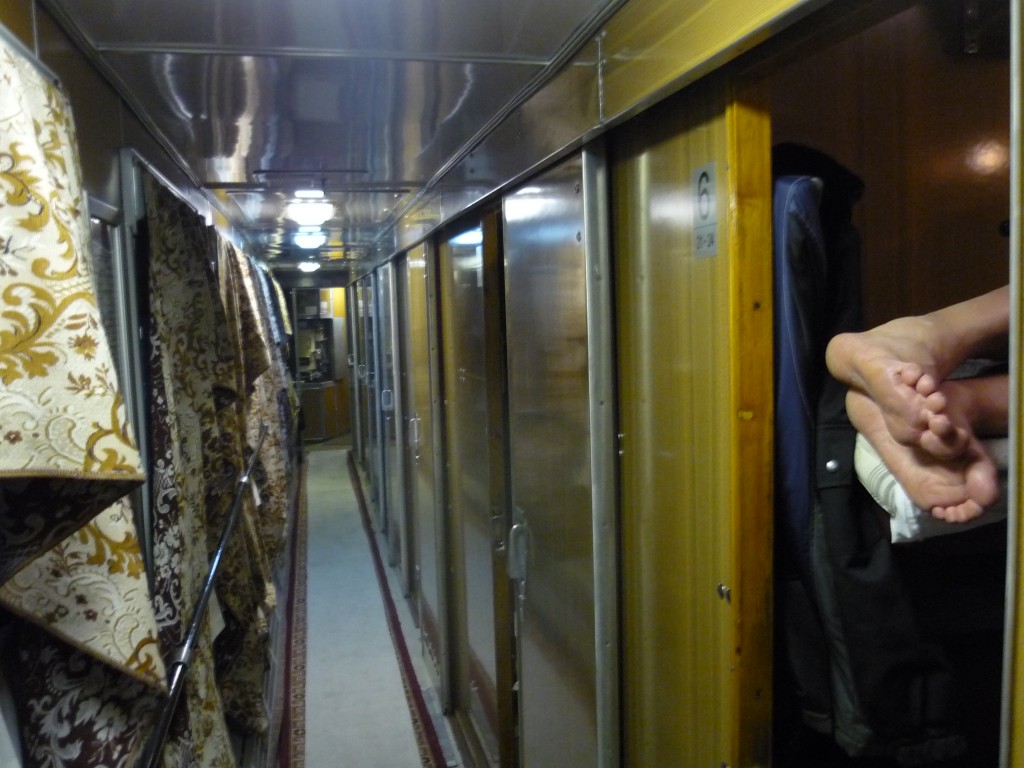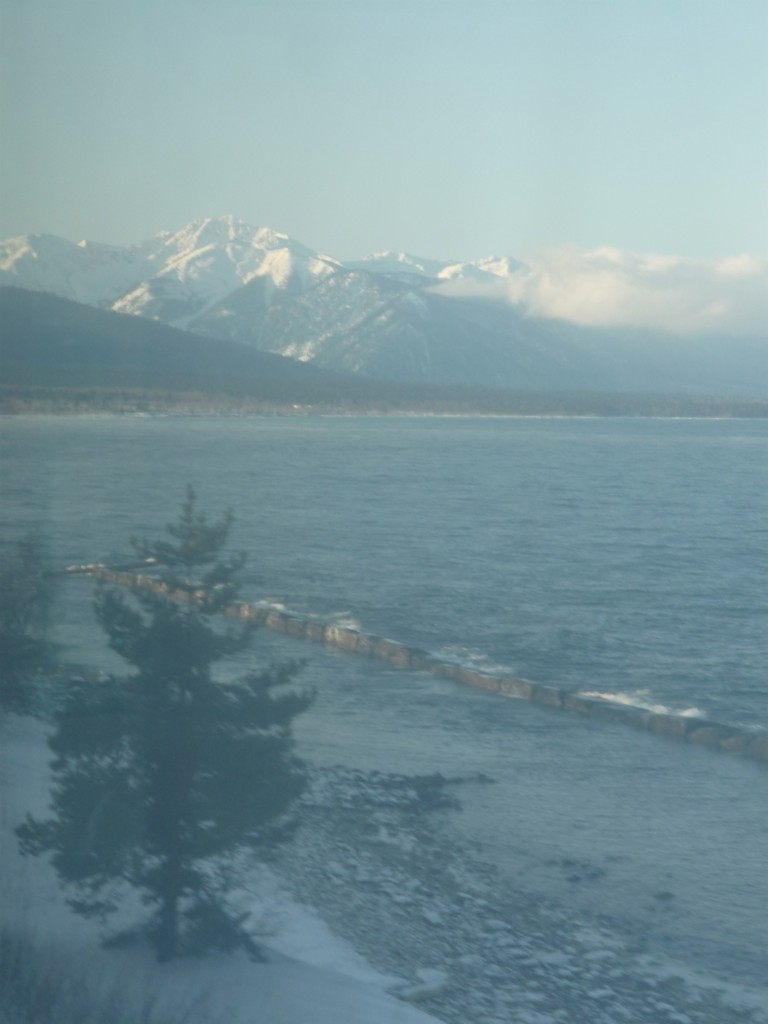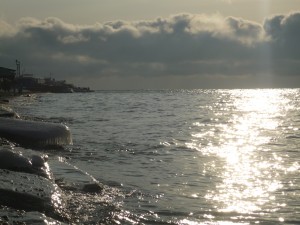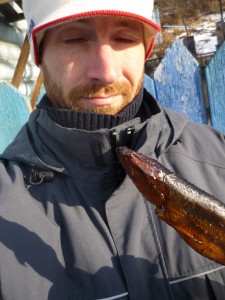Dec. 6
“Pazhalsta, gdye vagon restoran? Tam? Spasiba!”
I deploy my limited Lonely Planet Russian in order to complete the China-Mongolia-Russia dining car troika. Turns out, if you’re short of writing material, go to the dining car and drink a beer. Paying 90 Rubles ($3) for a litre of Sibirskaya Korona is a rip off. But as a lead to a blog post, it’s good value.
The dining car is all burgundy and gold drapes, brown and yellow tablecloths. A small table in the corner serves as a sort of “show and tell” menu of sweet, salty and alcoholic snacks available for purchase. I flip through the actual dinner menu without real interest. I can’t skim in Cyrillic yet, and in any case my own supplies are working out fine. There are five women in the dining car, but I can’t tell if any of them are passengers. Two of them are sharing the cashier duties, and one sits waiting to clean things up. They all look bored. Maybe that’s because I cannot understand what they are saying. I can only describe them as the sort of women who look like they work in a Siberian railway dining car.
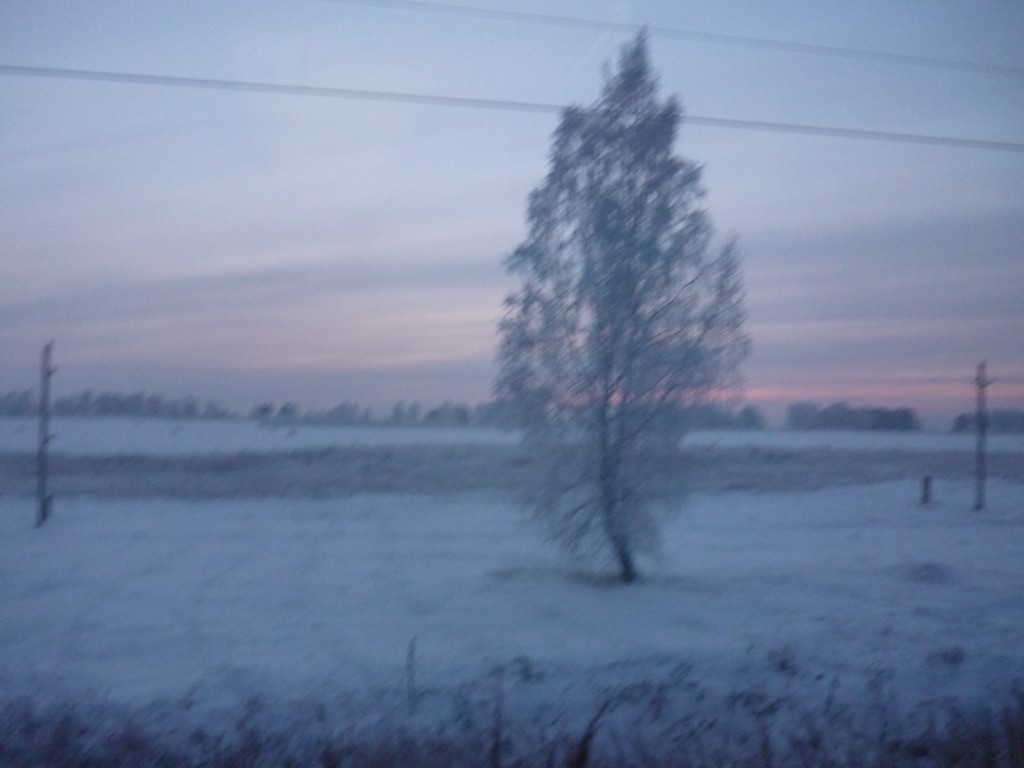 The train rolled out of Irkutsk at 10:55, heavy mist rising off the Angara river. It’s cold, the bare trees frosted over with ice, but the snow is not as heavy on the ground as I expected. There are vast fields, lumberyards, orange-vested railway workers trackside. Towns and villages pass by, with the usual assortment of wood houses, unfinished or derelict buildings. I share my kupe (second class) compartment with a silent middle-aged lady who leaves after two hours. Through the day, I have the space to myself. The provodnitsa (wagon attendant) comes in. She dips a straw broom in a metal bucket of hot water and bleach, and stoops to sweep the carpet. Later on, she walks past again in a bright yellow bathrobe. She lives on board, so it’s her prerogative I guess. Another attendant rolls crates of beverages down the corridor. It’s warm inside, the thermometer reading 26C. Tee shirt conditions as I write, boots off. Others in the wagon are sprawled on their bunk/bench, in flip-flops and tracksuits.
The train rolled out of Irkutsk at 10:55, heavy mist rising off the Angara river. It’s cold, the bare trees frosted over with ice, but the snow is not as heavy on the ground as I expected. There are vast fields, lumberyards, orange-vested railway workers trackside. Towns and villages pass by, with the usual assortment of wood houses, unfinished or derelict buildings. I share my kupe (second class) compartment with a silent middle-aged lady who leaves after two hours. Through the day, I have the space to myself. The provodnitsa (wagon attendant) comes in. She dips a straw broom in a metal bucket of hot water and bleach, and stoops to sweep the carpet. Later on, she walks past again in a bright yellow bathrobe. She lives on board, so it’s her prerogative I guess. Another attendant rolls crates of beverages down the corridor. It’s warm inside, the thermometer reading 26C. Tee shirt conditions as I write, boots off. Others in the wagon are sprawled on their bunk/bench, in flip-flops and tracksuits.
The train stops in the middle of nowhere. A few minutes later, two truncheon-wielding railway security police escort a handcuffed passenger towards – where? An exit? A detention wagon? I never find out. Train starts again.
At around 20:00, a man and his teenage son join me. Oleg and Nikita, their names are, going to Krasnoyarsk. I show them photos and videos of my journey on my laptop. Oleg reciprocates with cell phone pictures of the lumber truck he drives, and of some sort of tree trunk loading competition he won. Nikita will become a train engineer, if I understood right. With much pantomime, they teach me a few Russian words, which my Teflon brain quickly forgets. Good thing I wrote them down.
We doze some, with the lights on, and arrive in Krasnoyarsk around 04:00, where the father and son depart. A squat, potbellied man with a silver brush cut takes their place. For the next twelve hours, he snores. Even when he’s awake. Not a gentle air in – air out. Rather, a variable, loud, “KHHCHRRRR [in], PAHCHHH [out]” Repeated three or four times, an ominous silence, then it starts again. I’m doomed, my jaws clenched from the tension. Even the provodnitsa comes by to close the compartment door. No more sleep till Novosibirsk.

